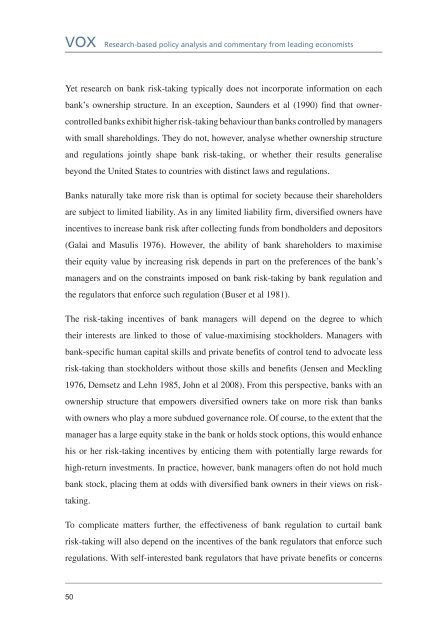Create successful ePaper yourself
Turn your PDF publications into a flip-book with our unique Google optimized e-Paper software.
VOX Research-based policy analysis and commentary from leading economists<br />
Yet research on bank risk-taking typically does not incorporate information on each<br />
bank’s ownership structure. In an exception, Saunders et al (1990) find that ownercontrolled<br />
banks exhibit higher risk-taking behaviour than banks controlled <strong>by</strong> managers<br />
with small shareholdings. They do not, however, analyse whether ownership structure<br />
and regulations jointly shape bank risk-taking, or whether their results generalise<br />
beyond the United States to countries with distinct laws and regulations.<br />
Banks naturally take more risk than is optimal for society because their shareholders<br />
are subject to limited liability. As in any limited liability firm, diversified owners have<br />
incentives to increase bank risk after collecting funds from bondholders and depositors<br />
(Galai and Masulis 1976). However, the ability of bank shareholders to maximise<br />
their equity value <strong>by</strong> increasing risk depends in part on the preferences of the bank’s<br />
managers and on the constraints imposed on bank risk-taking <strong>by</strong> bank regulation and<br />
the regulators that enforce such regulation (Buser et al 1981).<br />
The risk-taking incentives of bank managers will depend on the degree to which<br />
their interests are linked to those of value-maximising stockholders. Managers with<br />
bank-specific human capital skills and private benefits of control tend to advocate less<br />
risk-taking than stockholders without those skills and benefits (Jensen and Meckling<br />
1976, Demsetz and Lehn 1985, John et al 2008). From this perspective, banks with an<br />
ownership structure that empowers diversified owners take on more risk than banks<br />
with owners who play a more subdued governance role. Of course, to the extent that the<br />
manager has a large equity stake in the bank or holds stock options, this would enhance<br />
his or her risk-taking incentives <strong>by</strong> enticing them with potentially large rewards for<br />
high-return investments. In practice, however, bank managers often do not hold much<br />
bank stock, placing them at odds with diversified bank owners in their views on risktaking.<br />
To complicate matters further, the effectiveness of bank regulation to curtail bank<br />
risk-taking will also depend on the incentives of the bank regulators that enforce such<br />
regulations. With self-interested bank regulators that have private benefits or concerns<br />
50














